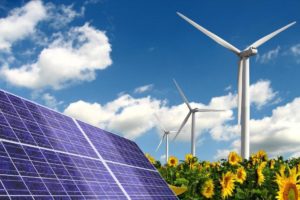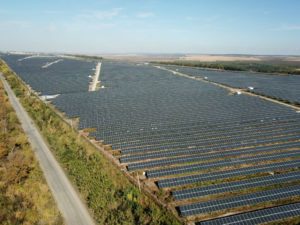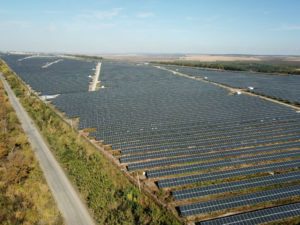
In Ukraine, due to problems with energy supply caused by shelling of energy facilities and infrastructure, a significant increase in demand for autonomous solar stations, both domestic and industrial, is recorded, Artem Semenyshyn, executive director of the Solar Energy Association of Ukraine, said.
“According to the results of our analysis based on data from the main suppliers and distributors of equipment, for domestic SPPs, demand for autonomous stations increased approximately 10 times, for industrial ones – 4-5 times,” he said, answering questions from a journalist from the Energy Reform Internet portal during a thematic online seminar in Kyiv on Wednesday.
At the same time, he noted that traditionally demand for grid inverters, which make it possible to supply electricity to the grid at a feed-in tariff, significantly prevailed over the demand for autonomous ones, providing personal power consumption.
At the same time, according to him, due to a sharp increase in demand in Ukraine, there is a shortage of the necessary equipment.
“There is not even enough equipment available. Here we compete for consignments of equipment with Europe, where the demand for solar power plants is also growing,” Semenyshyn said, expressing the hope that the situation with such equipment will improve in the coming months.
At the same time, he drew attention to the need to stimulate the development of small solar generation for personal consumption, given the situation with energy supply in the country.
At the same time, he pointed out that an autonomous solar power plant of the appropriate capacity has several advantages over diesel generators.
“For example, a battery has a response time of milliseconds, while a generator needs 1-3 seconds. In the case of a hospital, in particular, the switching speed is important in order to maintain certain settings of medical equipment. In addition, large generators consume a huge amount of expensive fuel, and the solar power plant battery can also be charged from the grid when there is electricity,” Semenyshyn explained.

The government of Ukraine is dealing with the problem of a solar power plant of Ekotekhnik Nikopol LLC belonged to the Canadian investor TIU Canada disconnected from the grid and proposes to solve it by connecting the solar power plant to another point, First Deputy Prime Minister, Minister of Economy Oleksiy Liubchenko has said.
“Supposedly, everything should be formally resolved at the judicial level, but we posed the question in a different way: to find an opportunity to connect to another point. Specialists are now working it out,” he said in an interview with Interfax-Ukraine.
According to Liubchenko, the rules of the National Energy and Utilities Regulatory Commission of Ukraine (NEURC) and other regulations should be configured in such a way that “no one would even have a thought to violate them.”
“And a private owner will cope better than the state. But the state can also take responsibility for the regional power suppliers’ work as an owner, especially when it comes to threats to national security,” he said.
As reported, the 10.5 MW power plant of TIU Canada was disconnected by the Nikopol Ferroalloy Plant (NFP) from the power grid of on March 2, 2020. TIU Canada said that NFP took advantage of the fact that the plant was connected to a substation located on its territory, and explained the need for shutdown by repair work. The shutdown caused the company in excess of EUR 1.5 million in losses, which continue to grow. TIU Canada challenged these actions in courts, but lost the lower court hearings, and the legal dispute dragged on.

OKKO Group plans to install solar power plants at more than 80 fuel filling stations, founder of the holding Vitaliy Antonov said on his Facebook page.
He also informed about the opening of a solar power plant at a fuel station in Odesa at 2a Pestelia Street.
“For the Ukrainian fuel retail, this is a unique project. Both from an architectural and engineering point of view. We do not just have solar panels on the roof here. They themselves are a roof. Some 316 panels with a total area of more than 600 square meters convert ultraviolet light into useful energy,” he said.
He clarified that thanks to its own generation, the new filling station will be able to independently cover up to 70% of its electricity needs, and in warm weather – 100%.
“And I want to note that we approach cooperation with the sun systematically,” Antonov emphasized.
The OKKO filling station network (Galnaftogaz Concern) is a part of OKKO Group and is one of the largest filling networks in Ukraine, numbering 413 fuel filling complexes. The structure of the company also includes Ukraine’s largest network of food outlets on the road operating under the brands Hot café, A la minute, Pasta Mia and Meiwei, as well as the specialized operator OKKO Agrotrade, engaged in the development of the agricultural direction.
The company’s divisions are engaged in the sale of goods through stores at filling stations, the sale of petroleum products in large and small wholesale, provide services for the examination of the quality of fuel, storage and transportation of petroleum products. The OKKO network has ten own oil depots, one gas pumping station, 19 stationary and mobile laboratories for quality control of petroleum products.
The shareholder and institutional investor of the company is the European Bank for Reconstruction and Development.

National Energy Company Ukrenergo on January 7, 2020 due to abnormally warm temperatures for this period of the year restricted loading generation of six large wind farms by 384 MW and eight solar power plants (SPP) by 545 MW in the period from 12:09 through 13:00, the company’s press service has reported.
Ukrenergo said that on that day, the average daily air temperature was -2.4°С, which is 4°С higher than the one on January 7 last year. Accordingly, consumption on January 7, 2020, decreased by 47.6 million kWh or 10.6% compared to the same period of the previous year (394 million kWh versus 441 million kWh).
Prior to this, all applications of balancing market players were used, electricity imports to the Integrated Power System (IPS) of Ukraine from Belarus and the Russian Federation were limited to zero, and the thermal power plants (TPP) generation was also limited by 1,350 MW.
Besides, at the moment of a sharp leap in the renewable energy generation from 12:09 to 13:00, there has already been no possibility to switch to the pumping mode the hydroelectric generators of pumped storage power plants (PSPP) since at that moment their reservoirs have already been filled.
At the same time, it is worth noting that due to the short-term nature of the balance deviations nuclear power plants (NPP) loading was not restricted.
“Therefore, in order to balance the power system and ensure its operational safety, NPC Ukrenergo dispatchers had to restrict the loading of powerful wind farms and SPPs,” the company said.
After that, from 13:00 to 13:46, all wind farms and SPP generation restrictions were rescinded.
GENERATION, LOADING, SOLAR POWER PLANTS', UKRENERGO, WIND FARMS

The National Commission for Energy, Housing and Utilities Services Regulation (NCER) has set feed-in tariff at 15.03 eurocents per kWh for Energy Den LLC with a capacity of 17.3 MWh (Bashtansky district, Mykolaiv region).
The commission approved this decision during a meeting on August 6.
The tariff is set until January 1, 2030.
The NCER also set feed-in tariff for the first stage of SPP Ternovytsia Solar LLC with a capacity of 13 MWh (Yavorivsky district of Lviv region). Another SPP in that region, Ternovytsia Solar Plus with a capacity of 12.8 MWh, received the aforementioned tariff.
Azymut Zakhid LLC with a capacity of 9.9 MWh and Tatarbunary Solar 2 LLC with a capacity of 9.9 MWh (both in Bilhorod-Dnistrovsky district in Odesa region) received feed-in-tariffs.

The National Commission for Energy, Housing and Utilities Services Regulation (NCER) has set feed-in tariff at 15.03 eurocents per kWh for Nick Solar2 LLC with a capacity of 15.4MW and Nick Sunstar with a capacity of 13.3 MW (Bashtansky and Voznesensky districts, Mykolaiv region).
The commission approved this decision during a meeting on July 30.
The tariff is set until January 1, 2030.
NCER also set feed-in tariff for Nick Green LLC with a capacity of 9 MW and Sunstar Pryvilne with a capacity of 7.4 MW (Veselynivsky and Bashtansky districts of Mykolaiv region).
Also, Ukrspecstroy Plus LLC with a capacity of 21.669 MW received the aforementioned tariff (Dniprovsky district of Dnipropetrovsk region).